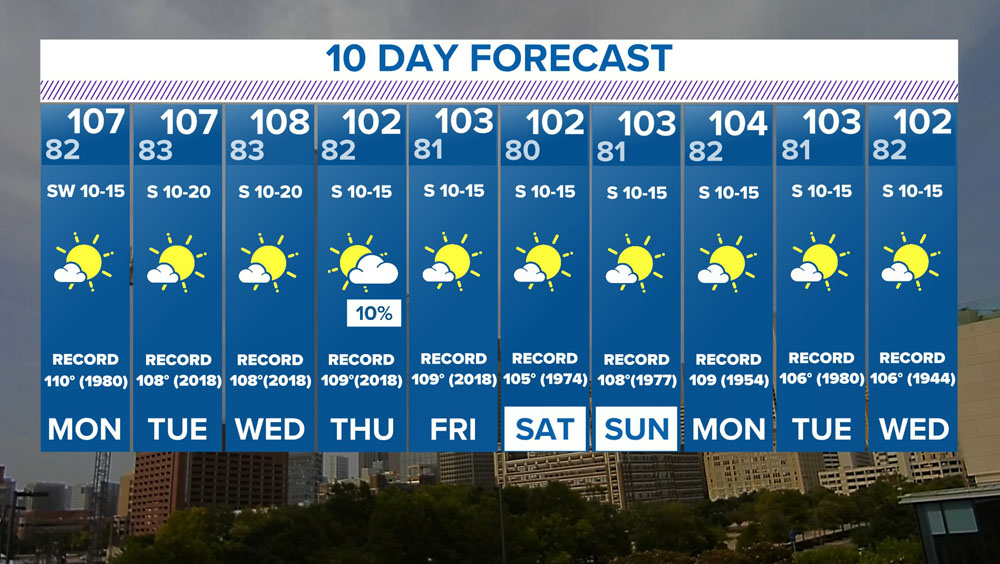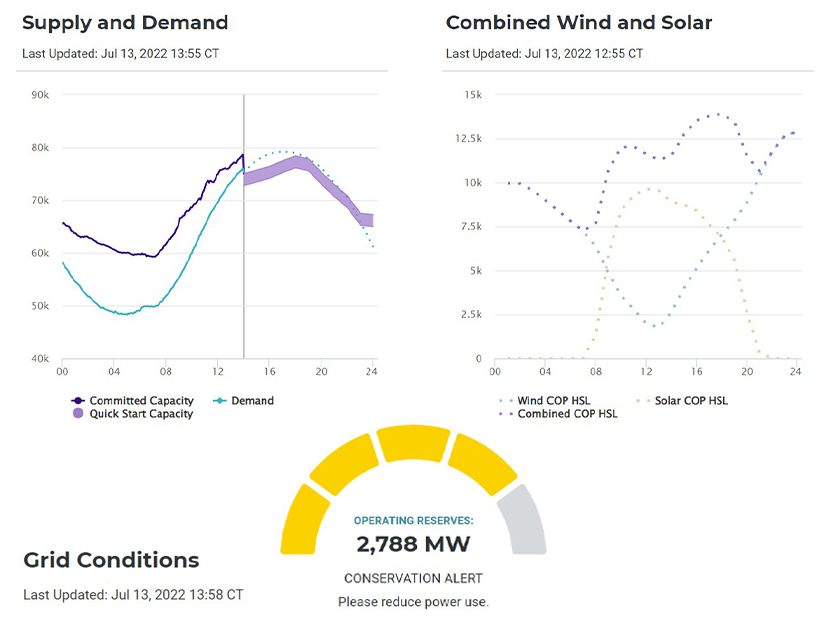Warnings that this week would include the highest temperatures yet this summer proved to be accurate Monday as ERCOT set yet another record for peak demand, its ninth of the year.
Demand averaged 79.038 GW during the hour ending at 6 p.m. CT. That shattered the previous mark of 78.4 GW set July 12 and marks the first time it broke 79 GW.
The record is likely to be short-lived, as ERCOT is projecting demand to break 80 GW today and Wednesday.
 Dallas Forecast | WFAA-TV
Dallas Forecast | WFAA-TV
Temperatures in Dallas were predicted to approach 110 degrees Fahrenheit early this week before cooling off into the low 100s. Texas has already suffered through its hottest May and June on record, and meteorologists expect more of the same through this month. Heat advisories remain in effect for much of the state.
The National Weather Service said widespread heat is highly predictable through Wednesday, and it has declared a moderate to high risk of excessive heat into August.
The record demand, 13 GW of thermal outages and reduced renewable production last week forced ERCOT to issue two conservation appeals to Texans and businesses. (See ERCOT Dances with Danger Again.)
“We want to be respectful of Texans, so we will only call for conservation if we need it,” staff said in an email to RTO Insider. They said the July 11 conservation appeal successfully reduced demand by about 500 MW.
Demand peaked above 77 GW from July 5 to 13 before dropping to just over 70 GW heading into the weekend.
The grid operator’s operations center has issued several watches in recent weeks because of projected reserve capacity shortages without a market solution that could lead to an energy emergency alert.
ERCOT said the forced thermal outages exceeded its forecasts. It was expecting only 67 of its 80 GW of installed thermal capacity to be available July 13 during the afternoon’s tightest hour (3-4 p.m.). Wind generation was again below its historical usage, dropping to 750 MW, about 2% of capacity, after the conservation period passed. Cloud cover in West Texas initially reduced the amount of available solar generation by almost 2 GW.
Operating reserves stayed below 3 GW during much of the afternoon.
Interim ERCOT CEO Brad Jones reminded the Houston Chronicle on July 12 that the grid operator is now calling for conservation earlier to help the grid avoid emergency conditions.
ERCOT deployed 927 MW of non-spinning reserves at 12:39 p.m. and then called on emergency response service (ERS) at 2:55 p.m. shortly before physical responsive capability fell below 3 GW. That forced dispatchers to issue another advisory.
During its open meeting Thursday, the Texas Public Utility Commission approved an order that increases ERCOT’s annual ERS budget to $75 million and allows the grid operator to broach this amount by up to $25 million for contract term renewals. ERCOT will be able to access the additional $25 million immediately upon the effective date of this rule (53493).
The grid operator said Monday morning that the Texas Commission on Environmental Quality (TCEQ) will allow resources to exceed their air-permit limits to ensure all possible generation is available to serve system demand. The TCEQ’s enforcement discretion began at noon and was expected to end at 9 p.m. Monday.
The commission allowed similar exceedances July 8-14. Prices exceeded the $5,000/MWh offer cap for four hours Wednesday, reaching as high as $5,500/MWh. Monday’s prices settled at a high of $1,419/MWh during the interval ending at 4:45.




